|
|
|
Sort Order |
|
|
|
Items / Page
|
|
|
|
|
|
|
| Srl | Item |
| 1 |
ID:
174488
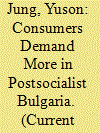

|
|
|
|
|
| Summary/Abstract |
What do consumer rights actually mean in a context in which citizens are unsure whether there is even a functioning judicial system …?
|
|
|
|
|
|
|
|
|
|
|
|
|
|
|
|
| 2 |
ID:
144511


|
|
|
| 3 |
ID:
130993
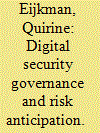

|
|
|
|
|
| Publication |
2014.
|
| Summary/Abstract |
The anticipatory turn in managing security and safety relies not only on innovative technological tools, but also on social practice. New information and communication technology, for instance, facilitates digital security governance1 which entails the collection, processing, storage, and sharing of digital personal data for risk profiling, but little is known about the role of security officials in preemptive security. Although people, or "data subjects," are categorized according to a (predefined) level of potential threat on the basis of digital data, it is often unclear which actor or agency was responsible for this categorization. This is especially unclear when information was shared across the globe between several security agencies and/or private companies. Nonetheless, as the assessment of risk or dangerousness affects someone's real-life opportunities, privacy rights or claims to something or someone are likely to be evoked.
|
|
|
|
|
|
|
|
|
|
|
|
|
|
|
|
| 4 |
ID:
106198
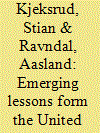

|
|
|
|
|
| Publication |
2011.
|
| Summary/Abstract |
Since December 2008, protection of civilians has been the primary task of the United Nations (UN) mission in the Democratic Republic of Congo (DRC). Guidance on how UN military units can contribute to the protection of civilians has been lacking, however. This has necessitated a bottom-up approach to protection of civilians in which the mission and its partners have developed a series of cross-cutting protection initiatives. The UN military plays a key role in many of them. Based on the findings of a 2010 field study conducted in the DRC, the paper discusses how UN military units can contribute to protection of civilians in three dimensions, namely civil-military cooperation, the use of intelligence, and the use of military force. The aim is to inform the preparation of military contributions to future missions mandated to protect civilians.
|
|
|
|
|
|
|
|
|
|
|
|
|
|
|
|
| 5 |
ID:
122689


|
|
|
|
|
| Publication |
2012.
|
| Summary/Abstract |
Military units around the globe use covers shelters and other storage systems to protect vehicles electronic equipment, bulk containers and other materials from the ravages or environmental conditions.
|
|
|
|
|
|
|
|
|
|
|
|
|
|
|
|
| 6 |
ID:
193831


|
|
|
|
|
| Summary/Abstract |
Looking back over the past seventy-five years of UN peacekeeping, the most enduring question has been: Is peacekeeping effective? Historically, most peacekeeping operations have been. However, peacekeeping is currently suffering from a significant trust deficit. One important factor that differentiates contemporary peacekeeping operations with a stabilization mandate from the historic record is the absence of a viable political or peace process. When security is not directed to serve a peace process, it produces a stabilization dilemma: the more effectively a peace operation protects and achieves stability, the less incentive there is for ruling political elites to find long-term political solutions. This dilemma generates several perverse effects, including prolonging the conflict, trapping operations in place with no exit options, increasing the resilience of armed groups, and embedding peacekeeping in the local political economy. The article identifies five factors that help prevent the stabilization dilemma and influence the effectiveness of peace operations.
|
|
|
|
|
|
|
|
|
|
|
|
|
|
|
|
| 7 |
ID:
158642
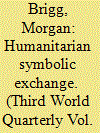

|
|
|
|
|
| Summary/Abstract |
Moral common sense frames the relationship between privileged and at-risk populations underpinning contemporary Responsibility to Protect (R2P) discourse. This article develops an alternative by considering the relationship between archetypes of would-be rescuers and victims through Jean Baudrillard’s theorisation of symbolic exchange. Baudrillardian analysis connects personal morality and affective intersubjective symbolic exchange with the politics of international order. This leads, first, to an argument that current foundations for advocating R2P risk participating in a problematic moral economy of symbolic exchange between would-be rescuers and victims. Nonetheless, and secondly, the article deploys symbolic exchange to develop suggestions for partially re-figuring R2P’s humanitarian impulse by engaging ‘locally’ – both through one’s self (in the ethical relation suggested by Emmanuel Levinas) and with diverse forms of political order (following Jacques Rancière’s conception of politics). Doing so supports moves to engage a wide array of individual actors in a more interactive and less hierarchical form of R2P, to drive deeper consideration of local complexities of R2P through engagement with diverse local forms of political order, and to develop a more inclusive understanding of ‘humanity’ in order to bolster R2P’s normative foundations.
|
|
|
|
|
|
|
|
|
|
|
|
|
|
|
|
| 8 |
ID:
085803


|
|
|
|
|
| Publication |
2008.
|
| Summary/Abstract |
The coastal zone is the interface between land and the sea and extends inlands and seaward to a variable extent depending on political, administrative, legal, ecological and pragmatic conditions. By virtue of any set of criteria, the coastal zone is a linear band of land and water that straddles the coast- a corridor in planning parlance - which has a one dimentional aspect
|
|
|
|
|
|
|
|
|
|
|
|
|
|
|
|
| 9 |
ID:
085299
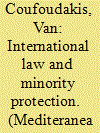

|
|
|
|
|
| Publication |
2008.
|
| Summary/Abstract |
In this essay a largely forgotten human rights issue involving the fate of the Greek-in-origin population that inhabited the Turkish islands of Imbros and Tenedos is examined. Exempted from the Greek-Turkish population-exchange agreements concluded following the end of World War I, the Greek population of the two islands was granted specific civic, cultural, and religious rights by the 1923 Treaty of Lausanne. The treaty remains valid to this day. Turkey deliberately violated the rights of this population because of its ethnicity, religion, and language. The author analyzes the methods used by Turkey to ethnically cleanse the two islands and the options available to the former residents of these islands as well as to the governments of Greece and Turkey to resolve the documented violations of the Treaty of Lausanne and of the European Convention on Human Rights.
|
|
|
|
|
|
|
|
|
|
|
|
|
|
|
|
| 10 |
ID:
139599
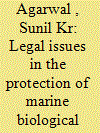

|
|
|
|
|
| Summary/Abstract |
States are facing new challenges with respect to conservation and sustainable use of marine biological diversity in areas beyond national jurisdiction (BBNJ). This underscores a significant gap in the existing legal regime, as embodied in the 1982 United Nations Convention on the Law of the Sea (UNCLOS), for protection of marine biological diversity beyond national jurisdiction. Thus, there is a critical need for a legal instrument to specifically address the regulatory and governance gap in this area. To this end, the United Nations General Assembly (UNGA) has set up an ad-hoc BBNJ Working Group. In January 2015, the BBNJ Working Group recommended that an international legally binding instrument under UNCLOS needed to be developed. This will enable UNGA to decide in its forthcoming 69th Session, in 2015, whether or not to launch negotiations for a new Implementing Agreement under the UNCLOS on the conservation and sustainable use of the marine biological diversity in areas beyond national jurisdiction. The details and contours of the new legal instrument, however, have yet to be agreed to, by the international community. It is suggested that international community may consider the precedent of the United Nations Fish Stock Agreement (UNFSA) for taking the next steps in devising a legal instrument. Further, there is also a need to consider an institutional arrangement to address existing BBNJ governance gaps.
|
|
|
|
|
|
|
|
|
|
|
|
|
|
|
|
| 11 |
ID:
176497


|
|
|
|
|
| Summary/Abstract |
International migrants are subject to many types of violence, such as trafficking, detention, and forced labour. We need an improved understanding of what protects migrants from such violence. The concept of ‘migrant protection regimes’ draws our attention away from formal rights advocacy and to both the informal dimensions of protection and the way migrants help determine the quality of protection they receive. ‘Migrant protection regimes’ are sets of rules and practices regarding who ought to protect whom. These regimes include formal rights to protection in the law and informal relationships that protect migrants from lawful violence by the state. They may be changed by ‘power grabs’, when sovereign actors seek to monopolise protection relationships, but also by ‘exits’, when migrants refuse to accept the protection on offer. The study demonstrates the value of these concepts by using them to explain an unlikely case: a change in laws concerning migrant protection in an authoritarian state: Thailand. Drawing on rich qualitative sources, the article reveals how, after a human rights advocacy campaign had placed migrants’ protection in jeopardy, a mass migrant exodus compelled the country's junta to offer migrants protection on better terms.
|
|
|
|
|
|
|
|
|
|
|
|
|
|
|
|
| 12 |
ID:
127410
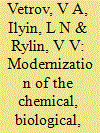

|
|
|
|
|
| Publication |
2013.
|
| Summary/Abstract |
The authors make a case for the need to develop chemical, biological, and radiological (CBR) protection in the emerging political, military, and economic situation; they also consider the possible effect of destruction of, or accidents at, chemically, biologically, or radiologically hazardous facilities on the behavior of troops and on the protection of the population and territories.
|
|
|
|
|
|
|
|
|
|
|
|
|
|
|
|
| 13 |
ID:
105714
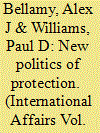

|
|
|
|
|
| Publication |
2011.
|
| Summary/Abstract |
In March 2011, the UN Security Council authorized the use of force to protect civilians in Libya. This was the first time that the Council has ever authorized the invasion of a functioning state for such purposes. International society's relatively decisive responses to recent crises in Côte d'Ivoire and Libya has provoked significant commentary, suggesting that something has changed about the way the world responds to violence against civilians. Focusing on these two cases, this article examines the changing practice of the UN Security Council. It argues that we are seeing the emergence of a new politics of protection, but that this new politics has been developing over the past decade. Four things are new about this politics of protection: protecting civilians from harm has become a focus for international engagement; the UN Security Council has proved itself willing to authorize the use of force for protection purposes; regional organizations have begun to play the role of 'gatekeeper'; and major powers have exhibited a determination to work through the Security Council where possible. However, the cases of Côte d'Ivoire and Libya also help to highlight some key challenges that might halt or reverse progress. Notably, states differ in the way they interpret mandates; questions are being asked about the UN's authority to act independently of specific Security Council authorizations; the overlap of regional organizations sometimes sends conflicting messages to the Security Council; and there remains a range of difficult operational questions about how to implement protection mandates. With these in mind, this article concludes with some suggestions about how the future challenges might be navigated in order to maintain the progress that has been made in the past decade.
|
|
|
|
|
|
|
|
|
|
|
|
|
|
|
|
| 14 |
ID:
084279
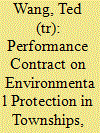

|
|
|
| 15 |
ID:
152042


|
|
|
|
|
| Summary/Abstract |
This paper was written based on a research at the grassroots level which was aimed to look into: (1) the relative position of women vis-a-vis the process of making policies on the protection of women migrant workers; (2) what efforts women have made; (3) what efforts women can potentially make, based on their current positions; and (4) opportunities and challenges that may arise. In arguing for the importance of women’s empowerment in conducting protection efforts for Indonesian women migrant workers, the research made the activities of three women activists from Paguyuban Seruni in Banyumas, Indonesia the object of analysis. The efforts and roles were identified through in-depth interviews and observations. Through self-development, enriching process and optimal achievement, along with access to education and involvement in the democratization process at the grassroots level, the women activists have made a valuable contribution to the efforts of protecting women migrant workers at the grassroots level. There are limitations and problems that these women have to face, but they all become motivations for them to move forward and actually do something through a process where self and community achievement are interrelated. At this stage of the research, this paper is aimed to showcase the lessons learned and best practices identified from the grassroots level, in the search for efforts worth making, developing and duplicating, with the aim of protecting women migrant workers working in the informal sector.
|
|
|
|
|
|
|
|
|
|
|
|
|
|
|
|
| 16 |
ID:
184184


|
|
|
|
|
| Summary/Abstract |
During civil wars, some communities raise self-defense militias to protect themselves from insurgent predation, but these militias can end up mutating into predatory organizations. The extant literature has focused chiefly on the predatory propensity of state-created self-defense militias and has mostly overlooked why some community-created self-defense militias segue into predatory organizations while others eschew predation altogether. This study explains this phenomenon, drawing on in-depth interviews with active members of two community-created self-defense militias (Ahlu Sunna Waljama’a and Macawiisley) in Somalia. In doing so, two sequential mechanisms (sponsorship and mobility) that determine the propensity of predatory behavior are introduced. Self-defense militias that conduct offensive operations engage in predatory behavior, irrespective of whether they are sponsored locally or have external patrons. Externally sponsored self-defense militias that engage in offensive operations attract opportunistic recruits and become motivated by material benefits, while community-sponsored self-defense militias that conduct offensive operations instrumentalize their position to settle old scores against rival communities. By contrast, self-defense militias that restrict their operations to defensive activities typically recruit dedicated homegrown members, and are regulated by community-managed accountability mechanisms that prevent predatory and abusive behavior. This community control remains crucial for defensive self-defense militias, who must balance external patrons’ strategic aims with their local objectives.
|
|
|
|
|
|
|
|
|
|
|
|
|
|
|
|
| 17 |
ID:
032715


|
|
|
|
|
| Publication |
Cambridge, MIT Press, 1988.
|
| Description |
xiii, 147p.Hbk
|
| Standard Number |
0262022826
|
|
|
|
|
|
|
|
|
|
|
|
Copies: C:1/I:0,R:0,Q:0
Circulation
| Accession# | Call# | Current Location | Status | Policy | Location |
| 031322 | 382.73/BHA 031322 | Main | On Shelf | General | |
|
|
|
|
| 18 |
ID:
189995


|
|
|
| 19 |
ID:
193833


|
|
|
|
|
| Summary/Abstract |
In the 1990s, conflict-related sexual violence (CRSV) started to transform into a matter of international security. Today, this is reflected in the Women, Peace and Security framework, which has left an impression also on UN peacekeeping mandates and operations, as well as on global protection imperatives. Simultaneously, academic attention to CRSV has skyrocketed in the past two decades. This article reviews what this growing body of research tells us about how peacekeeping authorities handle CRSV. In brief, scholars have identified encouraging trends in peacekeeping responsiveness to this violence, and prior research on its effectiveness in protecting civilians also gives cause for cautious optimism. Nonetheless, notable gaps in our knowledge remain, in particular when it comes to more local, fine-grained data and analysis. By way of conclusion, the article therefore outlines where the authors see the most promising avenues for future research on CRSV and peacekeeping.
|
|
|
|
|
|
|
|
|
|
|
|
|
|
|
|
| 20 |
ID:
132842


|
|
|
|
|
| Publication |
2014.
|
| Summary/Abstract |
Special Forces have always been associated with operations in unforgiving geography. Living and operating in mountains, deserts and jungles continues to play to their strengths in employing stealth, patience, endurance, speed and aggression as appropriate. They have come to rely on a menagerie of vehicles for the core requirements of mobility, firepower, protection and logistic support in all but the steepest, gnarliest terrain and increasingly rely on them to carry and power C4ISR equipment and provide export power to recharge personal equipment. Although they come to operate even more in small, isolated units they will increasingly have to be the most interoperable of forces.
|
|
|
|
|
|
|
|
|
|
|
|
|
|
|
|
|
|
|
|
|